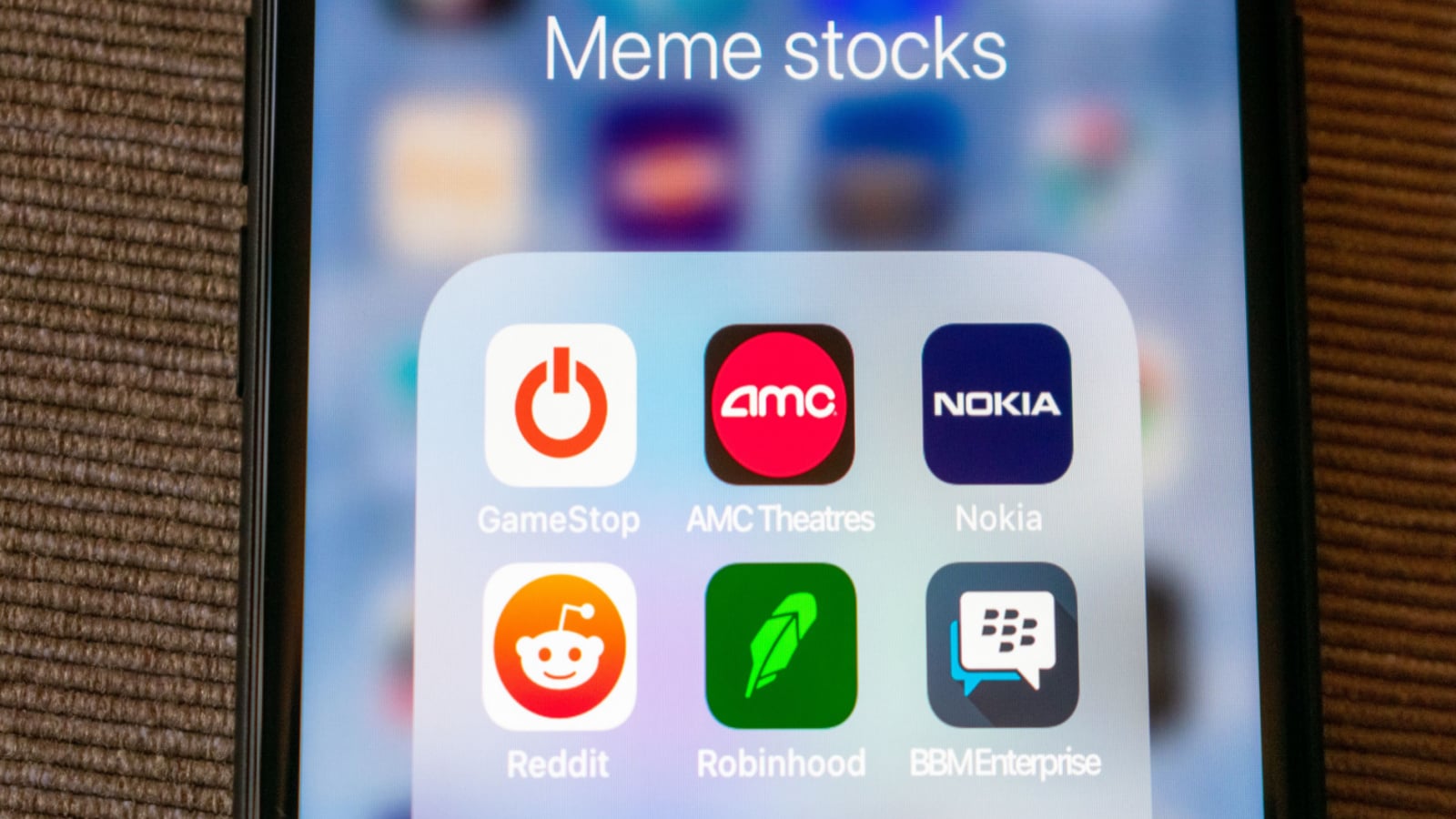Savvy investors are shifting their focus towards meme stocks to sell, adapting to the stock market’s changing trends where meme stocks have fallen out of favor. The trend, fueled by social media, morphed low-quality stocks into overnight sensations, spurring short-lived surges in value as online communities banded together. However, the excitement surrounding these stocks often masks the risks involved with such investments, making it imperative to scrutinize these volatile assets.
As the allure of meme stocks wanes, those that once dominated headlines now flounder, shedding most of their gains. Driven more by hype than solid fundamentals, these stocks present mostly perilous ventures. Therefore, investors need to be cautious and prioritize long-term stability over the fleeting gains of meme stocks. With that said, here are seven unattractive meme stocks bets likely to erode shareholder value further.
Meme Stocks to Sell: AMC Entertainment (AMC)

Renowned movie theatre chain, AMC Entertainment (NYSE:AMC), faces an uphill battle. Over the past year, its shares plummeted by roughly 90%. Moreover, this downturn is further exacerbated by a massive debt load of $9.32 billion. Adding to AMC’s predicament, external challenges such as the Hollywood writers’ and actors’ strikes have pushed project timelines further out, casting a shadow over AMC’s prospects for 2024 and beyond.
Moreover, the market responded unfavorably to AMC’s strategic moves, evidenced by a 30% stock price drop following the announcement to sell up to 40 million new shares in September 2023. Additionally, AMC’s efforts to reduce these challenges and its debt through debt-for-equity swaps have resulted in more shareholder dilution, increasing analyst skepticism over its future. Consequently, Quant analysts assign a ‘strong sell,’ rating to AMC stock, underscoring its challenging recovery path.
GameStop (GME)

GameStop (NYSE:GME), a top retailer in video games and gear, is navigating a rough terrain. Its share price is down more than 34.6% in the past year, a worrying drop in value. The company’s challenges are amplified by market volatility, tied to speculative trading on online platforms and social media. Such exposure has caused its stock price to fluctuate wildly, largely driven by conversations on forums such as Reddit.
In its most recent quarterly report, GameStop’s revenue fell to $1.08 billion, a 9.11% drop, missing expectations by $103.92 million. This downturn is part of a broader trend, with total assets decreasing by 5.29% and free cash plummeting by 99.24%, underscoring the company’s financial distress.
Furthermore, TipRanks analysts aren’t optimistic, assigning GME stock a ‘moderate sell’ rating and forecasting a potential downside of 57.51%. Hence, this grim outlook and the company’s current market position suggest a bleak future for investors.
Mullen Automotive (MULN)

Mullen Automotive (NASDAQ:MULN), an electric vehicle maker, reported a staggering $1 billion loss last year, with its stock plummeting 99.8%.
Despite delivering 231 vehicles worth $11.9 million in the fourth quarter, Mullen hasn’t recognized any revenue. Moreover, the company is struggling to build momentum as it continues to burn cash at an alarming pace each quarter. Its return on common equity at a negative 960% is indicative of its financial woes, likely to weigh down its future prospects.
With the CEO announcing in December 2023 the need to raise capital in 2024 to fund operations until becoming cash flow positive, Mullen’s future looks bleak. Given the abundance of better investment opportunities in the EV sphere, it’s best to steer clear of this stock at this time.
Carvana (CVNA)

Carvana (NYSE:CVNA), once celebrated as a pandemic success, is now in a major spot of bother, with its stock still more than 85% below its peak despite a 380.6% rally over the past year. This stark contrast underscores the auto retailer’s rollercoaster journey, now plagued by consecutive unprofitable quarters.
The excitement of being initially hailed as a tech titan has dwindled as reality sets in, with revenue growth plunging to negative 23% year-over-year (YOY), starkly underperforming the sector’s median at 5.2%. Moreover, CVNA’s future appears bleak, with forward revenue growth projected at negative 4% amidst a broader market slowdown. Its latest quarterly earnings reflects this downturn, where revenue fell 18.10% YOY to $2.77 billion.
Compounding Carvana’s woes is the declining auto market, particularly for used cars, where prices and demand are dwindling at a worrying pace. This trend will likely further impact Carvana’s top and bottom-line results, suggesting that the road ahead is fraught with challenges.
Meme stocks to sell: Nikola Corp (NKLA)

Nikola Corp (NASDAQ:NKLA) is now grappling with a stark downturn. The company’s struggle to maintain its stock above the critical $1 threshold has led to another NASDAQ warning, hinting at a possible delisting. This decline is closely tied to the fall of its founder, Trevor Milton, who faces significant legal challenges, including securities and wire fraud charges.
The firm’s woes deepened last year when it halted the production of its Tre battery-electric trucks due to fire risk in the battery packs, indicating severe operational setbacks. This stoppage, expected to extend into this year, underscores the severity of Nikola’s challenges.
Amid these struggles, Nikola’s market position has rapidly deteriorated, with its stock plummeting 70% over the past year. A disappointing third-quarter report deepens the concern, showing a Non-GAAP earnings-per-share (EPS) loss of 30 cents, 16 cents below expectations, and a negative $1.73 million revenue shortfall. These figures highlight the grim reality facing Nikola as it navigates through a turbulent period.
Faze Holdings (FAZE)

Faze Holdings (NASDAQ:FAZE) is a popular esports business that has witnessed significant volatility, with its stock plummeting more than 72.5% over the past year. The firm’s struggles stem from a misalignment between its business management and the ethos that originally fueled its fame. It lead to key members departing to become individual influencers, eroding its market value. Compounding these challenges, allegations of involvement in crypto scandals have further dented FAZE’s credibility.
Financial indicators reflect FAZE’s diminishing position, with YOY sales growth down by 10.7% and gross profit plunging by 84.8%. Additionally, net income dropped a staggering 94.5%, underscoring its precarious financial position. The combination of internal misalignments, controversy, and stark financial downturns underscores a period of major uncertainty for the company. With such instability, the company’s path forward appears fraught with challenges, signaling caution for investors.
Blackberry (BB)

Transitioning from a phone manufacturer to a cybersecurity and IoT firm did little to prevent BlackBerry’s (NYSE:BB) decline. Its share price went down 45.21% over the past year. The drop was driven not just by a decrease in market interest in risky investments but also by the company’s financial setbacks, including missing revenue targets by $5.8 million and a quarterly net loss that ballooned by 425%.
The company is struggling to turn around its fortunes, pushing towards positive cash flow through cost-cutting and margin expansion efforts. Despite these initiatives and reducing its debt by more than 40%, it’s under major duress with regard to financial visibility and ability to secure financing. Additionally, BlackBerry’s aggressive downsizing, including laying off employees and exiting global office locations, reflects its desperate measures to stabilize finances.
Furthermore, Quant analysts have cast a pall over BB’s prospects, tagging it with a ‘strong sell’ rating. The convergence of disappointing financial performance and investor skepticism paints a grim future for BlackBerry.
On the date of publication, Muslim Farooque did not have (either directly or indirectly) any positions in the securities mentioned in this article. The opinions expressed in this article are those of the writer, subject to the InvestorPlace.com Publishing Guidelines
